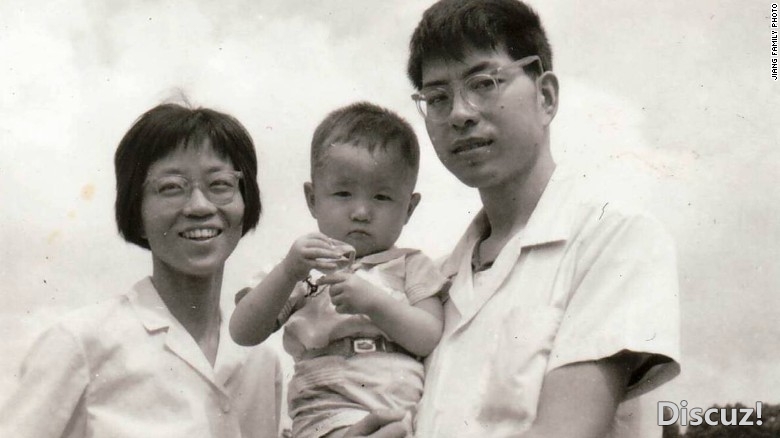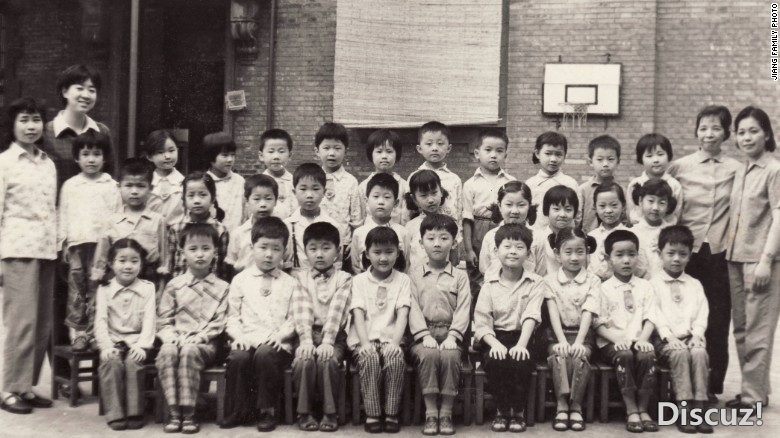|
|
本帖最后由 满仓 于 2015-11-4 09:24 编辑
【中文标题】中国第一代独生子女回顾政策的影响
【原文标题】China one-child policy: Member of first generation looks back at rule's impact
【登载媒体】CNN
【原文作者】Steven Jiang
【原文链接】http://edition.cnn.com/2015/10/29/asia/china-one-child-policy-personal-take/index.html
我生长在80年代的上海,那时候,从来没关注过我的大部分同学都是独生子女的这个事实。多年之后我才意识到,我是中国严格的独生子女政策下的第一代人。这项政策从70年代末开始,直到共产党在星期二表示将允许全国范围内的已婚夫妇生育第二个孩子。
我的同学和我都住在离学校很近的地方,狭窄的小巷边矗立着三层楼的公寓,里面挤满了三口之家。我们在一起学习、一起游戏,从来没体会到那些住在高层建筑物里的独生子女的孤独感。

CNN的史蒂芬•蒋在大约2岁时,和他的母亲简•张和蒋召荣在一起。
那是一个简单的年代,几乎所有中国人——包括那些大城市的居民——都一样的贫穷。我的父母在勉力应付他们的全职工作,他们似乎不敢想象再多一个孩子生活会变成什么样。
我们很早就在政治教育中接触到“一对夫妻只生一个孩”是一项“基本国策”。大部分人都完全接受党的这条路线,不仅仅是为了通过考试,而是真正相信,数百万没有出生的中国孩子让这个国家的经济得到了发展,改善了人民的生活水平。

1982年,6岁的史蒂芬•蒋(前排左三)在学校中的照片,大部分学生都是家里的独生子女。
对于成长在城市中我的大部分同龄人来说,独生子女政策是一个既成事实,似乎每个人都对此没有异议。后来在美国,我才听说了这项政策引发了很多恐怖的事件——强制堕胎、绝育、高额的罚款,甚至拆房子。
当我成为一名记者之后,有一个人给我了巨大的帮助,让我可以直接面对这项政策所引发的争议。陈光诚是一位双目失明的人权活动家,他戏剧性地逃离了村子里被软禁18个月的地点,这个行为让他成为了国际舆论的焦点。他的支持者披露,他长期以来为那些遭受农村计划生育办公室官员迫害的受害者提供法律援助,他因此也遭到迫害和监禁。当我详细了解了陈从农村到北京,最后再到美国的这段旅程,他的故事让我认识到党的这项政策的黑暗一面,而党依然把它当成过去三十年里中国经济飞速发展的推动力。
陈目前居住在华盛顿,他在电话里说:“一个孩子还是两个孩子,共产党没有权利决定人民可以生育多少后代。”他的声音并没有因为他为之抗争的一项政策终于寿终正寝而表现出喜悦。“从中央政府到农村,你知道共有多少专门从事相关工作的计划生育官员吗?”他问道,“他们通过野蛮地执行这项政策中,获取了巨额的利益。太多的既得利益集团,这就是为什么党不愿意废除整个计划生育制度。”
有一点,陈似乎赞成共产党的决定,在全球经济放缓的形势下,中国正在面临劳动力短缺和老龄化的双重压力。他说他认为这个新政策“太谨慎、太晚了”,但是领导人似乎希望以此来缓解这些压力。
两年前,他们试验性地允许部分夫妻——如果至少一方是家里的独生子女——生第二个孩子。但是根据官方自己的说法,民众——主要是城市的中产阶级——响应并不热烈,原因是高昂的生养成本。因为其极为有限的效果,最新颁布的政策是否会造成突破性的效果值得怀疑。
我的表兄特里在北京一家媒体工作做管理层,今年30多岁,他的妻子是公务员,他们有一个6岁的儿子。他在中国著名的社交平台微信上贴出了一篇我的CNN报道的截屏,他写到:“兄弟,即使你说的都对,我也养活不起第二个孩子了。”
但是党不愿意看到中国未富先老。
当中国独生子女政策的大幕逐渐拉上,我不禁在想,有一个兄弟姐妹该是什么样的感觉。
原文:
Growing up in Shanghai in the 1980s, I never thought much of the fact that most of my classmates were only children.
Years later I realized that I belonged to the first generation of China's strict one-child family planning policy, which started in the late 1970s and remained largely intact until the ruling Communist Party decided to scrap it Thursday to allow married couples nationwide to have two children.
My classmates and I all lived close to school -- in narrow alleyways lined with three-story houses, each with multiple families packed in. We studied and played together all the time -- none experiencing the loneliness that later generations of the single-child policy were said to suffer in high-rise apartments.
CNN's Steven Jiang aged about 2 with his mom and dad, Jane Zhang and Zhaorong Jiang.
It was a simpler time when almost everyone in China -- even in its biggest city -- was equally poor. Our parents looked way too preoccupied with juggling full-time jobs and full-time parenting to contemplate what life would be like with one more child.
We learned early on in our political education class that "one couple, one child" was a "fundamental national policy." Most of us bought the party line -- not just to pass the required exams -- that millions of prevented births helped China develop its economy and improve its people's living standard.
CNN's Steven Jiang, aged 6 in a school photo in 1982. Most of his classmates were also only children. He is front row, third from left.
To many Chinese of my age who grew up in the cities, the one-child policy was just the way it was, and everyone seemed to be fine with it.
It was much later in the United States that I began to stumble upon horror stories blamed on the policy -- forced abortions and sterilizations, exorbitant fines slapped on violators and demolition of their homes.
After I started covering this issue as a journalist, one person more than anyone helped me put a face on the controversies surrounding the policy.
Chen Guangcheng was a blind human rights activist whose dramatic escape from 18 months of illegal house arrest in the Chinese countryside threw him -- and his cause -- into an international spotlight.
His supporters maintain his longtime legal advocacy for victims of brutal enforcement of the one-child policy by rural officials had led to his persecution and earlier imprisonment.
As I followed Chen from his village to Beijing and eventually the United States, his stories kept reminding me of the dark side of a policy that the party still credits for the country's breakneck economic growth in the past three decades.
"One child or two children -- the Communist Party has no rights to decide how many children people want to have," Chen said from Washington, where he now lives, his voice showing no trace of joy about the end of a policy against which he had fought so hard.
"From the central government all the way to the village level, do you know how many family planning officials the system employs?" he asked rhetorically.
"They reap huge economic benefits from the brutal enforcement of this or any policy," he added. "Too much entrenched interest -- that's why the party won't scrap the entire family planning system."
One thing Chen seems to agree with the Communist Party is that China is facing a double whammy of labor shortage and aging society amid an economic slowdown. The activist said he thinks the new policy is "too little, too late," but the leaders are banking on it to address both of those challenges.
They tested it two years ago by allowing some couples -- if at least one of the spouses is a single child -- to have two children. By officials' own admission in state media, however, their target audience -- middle-class urbanites -- largely failed to respond, citing the high cost of pregnancy and child rearing.
That picture doesn't seem to have changed much, rendering the immediate impact of the latest policy change minimal.
My cousin Terry, a media executive in his early 30s living in Beijing with his civil servant wife and 6-year-old son, posted a screen grab of my CNN report on WeChat, a popular Chinese social media platform. Above the picture, he wrote: "Bro, even if what you said is true, I can't afford to have a second one!"
But the party can't afford to let China get old before getting rich.
As the curtain falls on the one-child policy in China, I wonder just a little what it would be like to have a sibling.
|
|